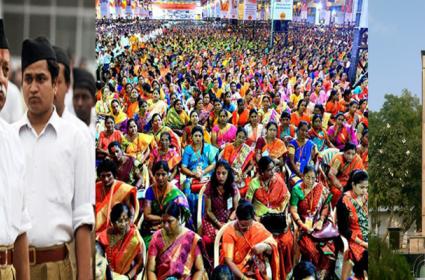Socio Political Churn Ahead

Mahesh Vijapurkar
It was something eerily different in Maharashtra this year. Apart from the annual rally addressed by the RSS chief, Mohan Bhagwat at Nagpur, commemorating its founding in 1925, and another by Uddhav Thackeray in Mumbai, also marking the birth of Shiv Sena, there was something else which was not been taken serious note of.
It was the remembrance of the conversion of some six lakh people from Hinduism’s insulting fringe to Buddhism led by B R Ambedkar. The mass conversion was not on Vijayadasami like RSS and Shiv Sena’s birth, but on October 14 in 1956. The media found space for the public event, but mostly for the RSS and the Sena. This year, and on the mass conversions’ 60th anniversary, the three coincided.
This coincidence is of some import because of the way it was seen by the media and in the contemporary context. The other two found even live TV coverage, but the Dalit gathering of a larger size as it always is, became barely a footnote. The deeksha event and the RSS supremo’s speech were in the same city – Nagpur, but the attention was not on the Dalit event. It makes one wonder whether on that day, media decided the pecking social order once again.
When media ignores something, it implies the event has less relevance, either in terms of its purpose, proximity, or of interest to a mass of readers. Or lacks novelty. It is true that no one of Ambedkar’s status – there hardly can be anyone like him, really – is present but the entire generation the neo-Buddhists and their subsequent generations gather to pay homage to him who they call a mahamanav.
Dalilts are always a notable issue, and the term include those who have been outside the Buddhism despite their harassment by the upper castes. This year, they are in worse state because as in the past during Ambedkar’s time, they have chosen to call the bluff of the oppressing castes, as was seen in Gujarat. They chose not to clear or skin the carcasses of the village bovines. That was after an assault on them by gaurakshaks.
There was the flurry of reports, even carpet-to-carpet coverage in the media when any related incident, any quote or claim was news fit to print. There was outrage shown on all news outlets. But suddenly, there’s an ominous quiet. We are not being told if the Dalits had resumed the tradition of skinning the carcasses, or if they continued with the ban, how were they being disposed.
Nor as to what was happening to their livelihoods. Or the inter-community relationships because easily triggered tensions in a village can be more palpable than in a town or city where the media have to be the catalyst. Is the boycott of a demeaning but traditional task being dealt with by the upper castes is something the world would like to know. But the media are not obliging. Not even from the upper caste point of view.
In Maharashtra, when the Marathas moved to a sudden mass agitation phase using the rape of a Maratha girl by alleged Dalits as a trigger, they focused on reservations for themselves. But slowly the voice demanding the weakening of the SC & ST (Prevention of Atrocities) Act, 1989, it is being conveyed by the media. Though the Dalit leaders like Prakash Ambedkar (grandson of the mahamanav) kept the community from a counter-agitation, the Dalits and tribes are getting restive.
They could be militant and get into a showdown but there is a realization that the Central law is not easy to be diluted to “prevent its misuse” which Marathas allege is common. It is not within the domain of the state government, and not all states are likely to support it even if Maharashtra were to knuckle down to the Marathas. The media have been unwittingly building pressure by exaggerating the attendance at the silent Maratha rallies.
If the Marathas were to get a few sops if not the reservations in education and jobs, they may not be happy because the Atrocities Act is their old grievance. The Marathas had not taken kindly to the renaming of the Marathwada University after Ambedkar in the 1980s. The Dalits saw that reluctance as a hurdle in their effort at self-realization. That was when the divide between the two communities came to the fore though had been simmering in the past.
Some churn, therefore, is ahead. But as in everything else, a social issue – be that the Maratha demand for quotas, or the dilution of the Act, or a sudden outburst from the Dalits who have been complaining for long that the authorities do not take their complaints seriously to register them under the said Act – were to mix with politics. Because politics has little to do with social issues of import except to use them as a vehicle.















